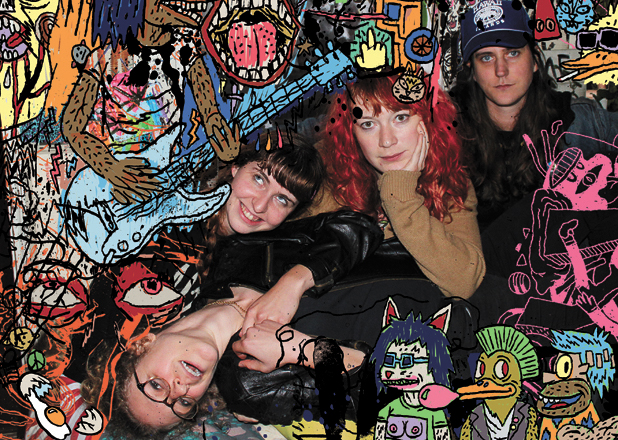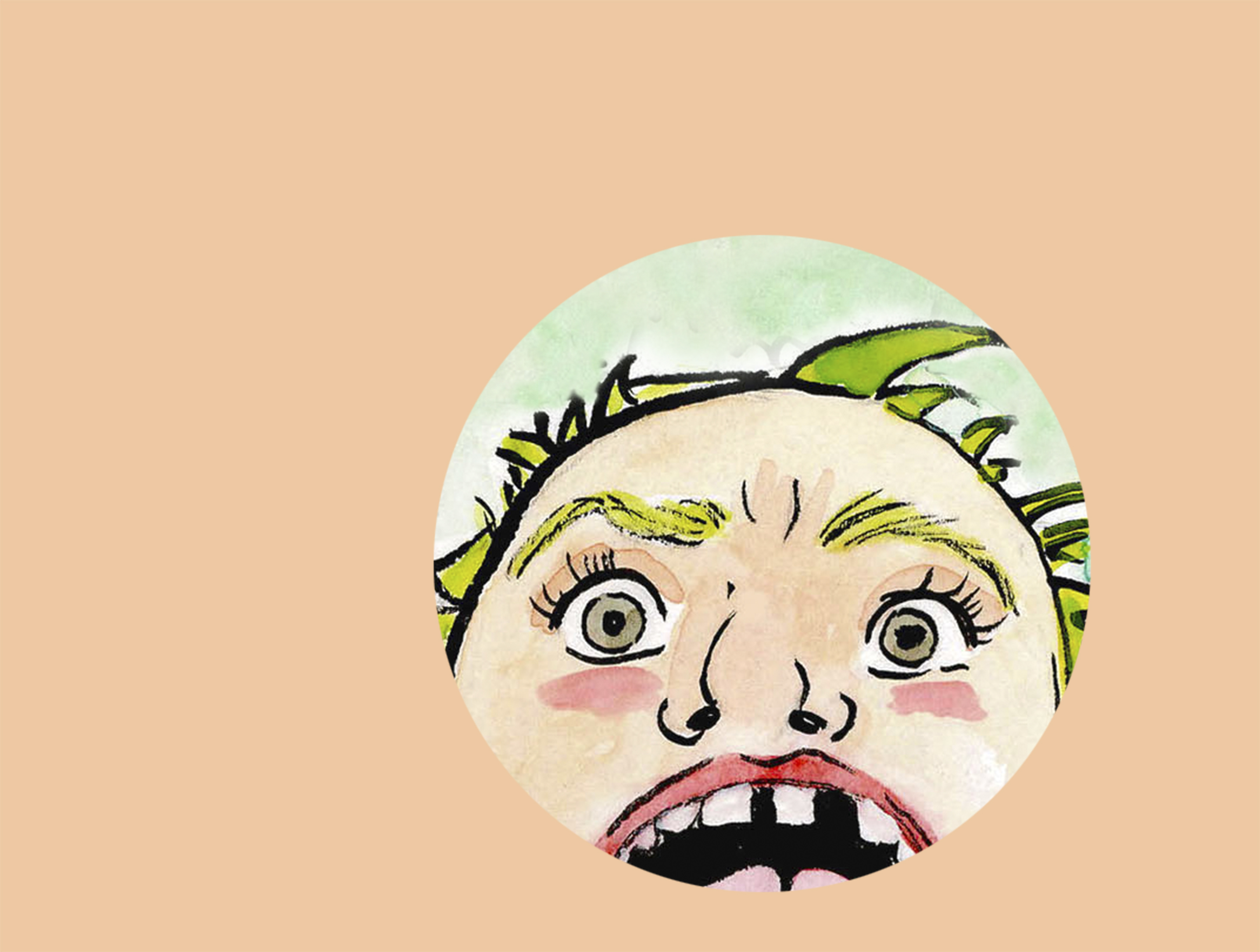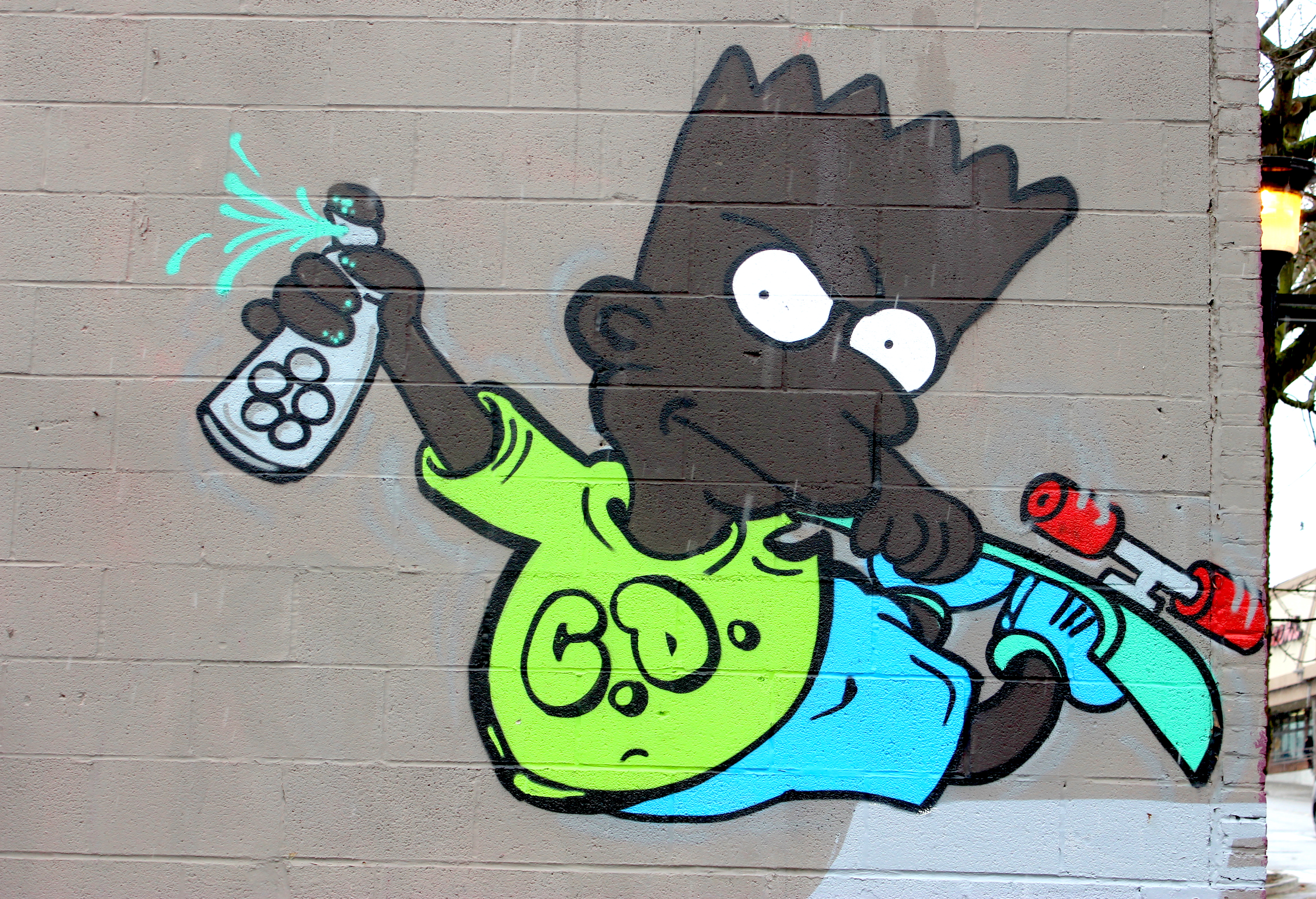Naomi Punk performing at Cairo’s 2014 Vibrations Festival. GIF by Kelton Sears
Travis Coster, Naomi Punk’s singer and guitarist, is stressed out. He scratches his half bleached-blond head of hair and starts rubbing his temples.
“Man, I guess I don’t even know if punk is important,” he says. “That’s why I was kind of nervous about meeting.” He sits silently for a moment, mouth agape, fiddling with his glass of Olympia beer before throwing his hands up. “Maybe it is important… but I don’t even know. Punk is super-important to me, I love punk music, I connect with it and I love its conventions, but it’s also sort of besides the point. Like—I honestly love the new Taylor Swift album. It’s not like I’m trying to hold up punk as this noble thing… but I guess I do kind of identify that way.”
I’m here in Olympia on Naomi Punk’s home turf on a fool’s errand. I’m trying to figure out what punk means. I’ve asked a bunch of local punk bands, “Why is punk important to you in 2014?”
This approach has proven more difficult than I anticipated. I’ve quickly learned that nothing is more nebulous than the word “punk.” There is nothing less punk than talking about punk. Punk operates like a quantum particle: As soon as you try to measure its properties, it disappears and reappears somewhere else in spacetime. It is Schrodinger’s cat—paradoxically both alive and dead as long as the outside observer doesn’t open the box. But here I am in Olympia, sitting down with Naomi Punk in a dimly lit goth bar, opening the box anyway.
John Roderick believes he possesses the answers to these questions—or at least he did when, on March 6, 2013, Seattle Weekly published his cover story “Punk Rock Is Bullshit.” When it came out, I remember incredulously reading it on my smartphone in a tour van, passing it around to my bandmates and asking “Can you believe this shit?” Ironically, four months later I was hired as a staff writer for the Weekly. At that moment I made a blood oath to myself that if I was going to work here, one day I would rebut that monstrosity.
So here I am.
After about 40 minutes of my vain, awkward attempts to coax out what’s inside Naomi’s Schrodinger Punk box, the band’s mop-haired drummer, Nick Luempert, decides to take a different approach. He attempts to explain the qualities of the box itself.
“So, punk as a concept, it’s less what it’s about… it’s more just a space,” he says. “It seems like it’s a response to the mainstream. A big record company isn’t trying to carve out a space, it’s trying to consume and take in anything it can. In carving out this space, ‘punk’ or whatever you want to call it, it’s kind of the opposite: You’re trying to situate in this very specific spot and figure out how you can exist within that limited space instead of just absorbing everything.”
Now we’re getting somewhere.
Roderick, as the 40-something lead singer of indie rock band the Long Winters, has watched a generation of punks mature. As is made clear in his essay, he doesn’t like what he’s seen:
For those of us who grew up in the shadow of the baby boom, force-fed the misremembered vainglory of Woodstock long after most hippies had become coked-out, craven yuppies on their way to becoming paranoid neo-cons, punk rock provided a corrective dose of hard truth […] But over time punk swelled into a Stalinistic doctrine of self-denial that stunted us. The yuppies kept sucking, but by clinging to punk we started to suck too. I have friends in their mid-40s who don’t even have a savings account because ‘saving money’ never seemed punk rock.
But I did not grow up in the shadow of the baby boom. Neither did the majority of the Northwest punks I admire who made noise in 2014. We grew up in the shadow of the Great Recession. We grew up in the shadow of unchecked climate change caused by unchecked capitalism. And now, in Seattle, we’re growing up in the shadow of Amazon beneath an army of construction cranes that are squeezing out art spaces and affordable housing. Not only is the music industry on the wane—the ecological systems that sustain the whole goddamned planet are collapsing. And of course we don’t have savings accounts—70 percent of us are still paying off our historically high student loans and struggling to pay our historically high rents.
Perhaps Roderick’s punk was bullshit. But this isn’t the UK circa 1976. This is Seattle and it’s the dawn of 2015.
Our “punk,” or whatever you want to call it, isn’t bullshit. It’s not a dude with a Mohawk, a swastika tattoo, and a safety pin through his lip spitting on the audience because he thinks nihilism is the only truth.
That dude just sounds like an asshole.
Our “punk” is, as Luempert very simply explains it, a space: a way of situating yourself in a world that in the 21st century is figuratively and literally overflowing with lots of real bullshit. It’s one of the few tools or frameworks that marginalized artists without bountiful 20th-century resources have to help us wade through that bullshit and find some sense of meaning and agency. To those living it, it feels like anything but a Stalinistic doctrine of self-denial; it just feels like a natural, biological reaction to the environment we find ourselves in.
Everything is shit and garbage and we live in a trash world,” Coster suddenly blurts out.
“Everything that is romantic is basically a joke and garbage, and you can either deny that or accept that. You can sift through the trash, and I think that’s more interesting.”
Travis Coster and Nick Luempert of Naomi Punk. Photo by Morgen Schuler
This outlook, I suppose, would explain Naomi Punk’s songs “Trashworld” and “Rodeo Trash Pit.”
What Coster is saying really isn’t melodramatic or radical. As we sit in this dark bar in Olympia, an enormous patch of garbage—roughly the size of Texas, some researchers estimate—floats in a vortex in the Pacific Ocean. The microplastic fragments in this ecosystem of trash outweigh the surface zooplankton six to one. Thanks to “biomagnification” up the food chain, by the time we humans eat fish that have fed in the North Pacific, there’s a very good chance that fish has eaten a lot of plastic.
To put it in slightly more poetic terms: On planet Earth, humans are literally eating their own trash.
So, scientifically speaking, Coster isn’t exaggerating when he says “everything is shit and garbage.”
He continues. “The world has been destroyed. It’s kind of fucked our generation. I’m pretty into embracing the garbage. Making bad riffs and forcing them to be good when they are bad.”
Naomi Punk’s particular style of punk certainly sounds like it’s cobbled out of some castoff hunks of plastic from that huge swirling gyre in the Pacific—brutish, neo-primitive pop riffs warbling out of an old broken VHS player. Their newest record, Television Man, released in August, even has a song entitled “Plastic World no. 6.” The band’s website, the one beacon in its nearly nonexistent web presence, is purposefully constructed to be a confusing HTML mess, a disorienting bit of web trash that you as a human have to physically stop and untangle in order to proceed and harvest what scant information resides inside.
When you watch the band live—Luempert in his ill-fitting XL T-shirt pounding the drums like a child while Neil Gregerson and Coster awkwardly scissor their hands across their broken-sounding guitars—it’s like witnessing a gang of kids traipsing through some post-apocalyptic wasteland and making the most of it. As heavy as the music gets, it’s often triumphant: music to slay concrete dragons by.
“This trash vibe, this idea of sifting through things that have already been used up, that’s punk to me,” Luempert says. “The trash is used up, and punk’s been used up—but you can still use the trash around you in the world as a medium to explore things for yourself. It’s ultimately this optimistic thing. You don’t need to ask permission or have x and y resources or talents to do something new and meaningful, you can just sort of… rearrange the trash until you find some sense of personal transcendence.” It’s an approach that’s gained the band a following, taking it from the Northwest DIY underground to elite Brooklyn record label Captured Tracks.
But before jumping to Captured Tracks, Naomi Punk released its debut, The Feeling, on Couple Skate, a small Seattle-based record label that started as a way for its co-founder, Andrew McKibben, to release music from his own band and the music of the friends he made growing up in Seattle’s all-ages DIY punk scene. When we sit down at The Twilight Exit in the Central District, he’s just gotten back from CMJ. He also starts talking about trash—or rather, the overflow of garbage music in the world.
“It’s funny about CMJ, or things like SXSW—there’s so many bands and there’s so much bullshit,” he says. “There’s an immense fucking ton of music in the world I’ll never listen to. There are a lot of record labels that have this faceless sort of blog filter and they sign whatever Pitchfork says. There’s no story or narrative behind it. That’s one of the really important things that sets us apart—we’re coming from a very specific place and are telling a story about a community. I feel very connected and rooted in the community here. To me the point of all this is to give back to my friends and this place that fostered me.”
McKibben sweeps back his long hair.
“I run a fucking small indie label in 2014. Nobody’s making any money off this. The only reason to do it is to have fun and help your friends function as a band. For me, the thing about punk and the label, I’m just doing it because it’s the only thing that makes sense to me.”
Will Anderson from Weed. Photo by Kelton Sears
The point, from a punk perspective, has always been about supporting your fellow freaks in your community amid the cultural garbage surrounding you. Couple Skate signees Weed, an incredible Vancouver, B.C.-based punk band, values that community above all else. Out of the comic shop he works at, Weed’s frontman Will Anderson began printing his own monthly newszine, Dunk, intended to provide an all-ages calendar on the back page.
“It was my attempt to unite these scenes in Vancouver and bring these communities together,” he says. “When you’re on your deathbed looking up, it’s like, what are you going to think about? I don’t want Weed to be another fucking buzz story and look back and go ‘We made x amount of money and saw the green rooms of America.’ I don’t care. My goal in Weed is not to expose as many people in the world to Weed as I can. I just want to put out cool records and play cool shows.”
Perhaps unwittingly, what Couple Skate and Anderson are attempting to do is nothing new. The concept stretches all the way back to at least 1980—to the dawn of the Pacific Northwest’s unique punk history, which coincidentally also started in a zine:
Only by supporting new ideas by local artists, bands, and record labels can the U.S. expect any kind of dynamic social/cultural change in the 1980s. This is because the mass homogenization of our culture is due to the claustrophobic centralization of our culture. We need diverse, regionalized, localized approaches to all forms of art, music, and politics. Tomorrow’s pop is being realized today on small decentralized record labels that are interested in taking risks, not making money.
This passage is from “New Pop! Manifesto” by then-Evergreen State College student Bruce Pavitt, published in issue #1 of his scrappy zine, Subterranean Pop. Pavitt would go on to turn the underground music fanzine into Sub Pop, the label that made Seattle the music city it is today.
If it weren’t for that punk manifesto, I doubt John Roderick would even be here making music. Without Sub Pop’s support of the unique Northwest punk community, there would be no Barsuk Records. And without Barsuk Records, Roderick’s band The Long Winters might not have had a music career.
Without Northwest punk, Roderick might not even have his savings account.
Fancy that.
The witches of Lisa Prank and Childbirth. Gif by Kelton Sears
The head of a bass drum is hanging from the tree outside of Bree McKenna’s house in Seattle. Someone has, for whatever reason, impaled it on a branch. I can hear her and her bandmates in the all-lady feminist punk group Childbirth laughing on the porch, bathed in the iridescent glow of some weather-worn Christmas lights. Grimy old plastic cups and bits of trash are strewn at their feet. Their good pal, Robin Edwards, who goes by “Lisa Prank” in her own one-woman pop-punk project, is enthusiastically musing aloud on the merits of Sheryl Crow.
The group waves as I walk up their staircase. It’s coated in Sharpie drawings of trolls, smiley faces, emoticons, and the myriad fleeting thoughts of the countless Seattle punk bands who have claimed this home over the past 10 years, such as:
“1-800-YOLO-LOL”
“I am a Catholic witch, I have sooooooo much guilt”
“RAD SKANK COOL SLUT FRigiD WhoRe.”
“It’s kind of a piece of shit, but I love it,” McKenna says, inviting me up to Edwards’ room for our interview. “It’s super-cheap. Everybody complains about rent in Seattle, but we’ve found a way to deal with it so we can be in a band and make art.”
Stacy Peck, the band’s drummer, is still figuring out a way to deal with it. “I’m moving out of my apartment right now,” she says. “They’re low-income apartments, but I’m moving out because even those are too expensive now; I can’t afford it. I’ve always done low-income apartments, but even the very bottom is too much for what I make at my job, which is really depressing—it’s just not a thing you can do while you play in two bands and do art. I wish Seattle appreciated art more.”
She stops and thinks for a moment. “Seattle’s not cool because of Amazon.”
The offhand remark reminds Julia Shapiro, Childbirth’s frontwoman, of a conversation she just had with Lisa Orth, an amazing local tattoo artist perhaps most famous for designing Nirvana’s logo for Sub Pop in 1989. Apparently, Orth told Shapiro she had met an HR person from Amazon who had personally hired 12,000 people in the past three months, many of whom are living in hotels, waiting for those cranes to finish building housing for them. That combination of housing demand and new building has drastically, and quickly, changed the landscape for all Seattleites. Average monthly rent on a one-bedroom apartment has climbed from $1284 to $1400 in the past six months alone.
“It’s fucked. It’s capitalism that’s fucking everything up, you know?” Shapiro grimaces.
Capitalism did not stop Childbirth, however. The band released a 17-minute cassette in January 2014, entitled It’s a Girl, that they “only spent $100 on and five hours recording,” Peck says, laughing. “We didn’t take it super-seriously, but then I made a video for our song ‘I Only Fucked You as a Joke,’ and it went viral.”
The song is exactly what it sounds like: a punk song about fucking someone as a joke, and regretting it, but not really giving a shit anyway because “I can’t make good decisions everyday,” as the lyrics go. In the gloriously low-budget video, the band pelvic-thrusts on various statues around town—Isamu Noguchi’s Black Sun in Volunteer Park, the Jimi Hendrix statue on Broadway.
“We don’t have PR, we put out a cassette tape,” McKenna laughs. “It ended up on Pitchfork and we didn’t even do anything.”
It ended up a lot of places, actually. Spin called “I Only Fucked You as a Joke” the #9 song of 2014, beating out Drake and Katy Perry. Stereogum named it the #1 Song of the Week. Bust and Brooklyn Vegan spotlighted the group (the latter of which resulted in some extremely unfortunate rape threats and overt sexism in the comment section), and soon—most perplexingly to the band—a number of long, in-depth essays analyzing the cassette’s meaning and political/sociocultural context started popping up online.
L-R: Julia Shapiro, Robin Edwards (Lisa Prank), Bree McKenna, Stacy Peck. Photo by Kelton Sears
Whether or not they realize it, the ladies in Childbirth are direct descendants of “New Pop! Manifesto”—proof you don’t need money to make change or make people think. You just need to think a little differently.
“It’s funny—we weren’t trying to be political, we were just singing about what made each other laugh and what we felt,” McKenna says. “I think that maybe when we write songs, it’s about what we want to see. It’s like, I didn’t identify with the sexist bro punks I was hanging around, so we made our own scene. That’s why all the women in the punk scene here are so awesome; they foster each other’s stuff. We hang out with feminist women, feminist men, and we make our own reality in music right now. It was just a natural thing, but I guess people noticed.”
McKenna is right. The local punk scene in 2014 was dominated by women. Lady-led bands like Tacocat, Wimps, Chastity Belt, Lisa Prank, Vexx, Hysterics (R.I.P.), Darto, Vats, Stickers, The Witches Titties, and Childbirth put out some of this year’s best music and put on some of its best shows.
Peck says that the special punk community here was a natural reaction to “that bullshit” that McKenna and Shapiro were describing earlier. It’s a community that offers vital support by going to each others’ shows and even getting each other jobs—as Peck did for Shapiro when she moved here from Walla Walla a couple of years ago, securing her a gig at Capitol Hill bar Redwood.
This is all warm and fuzzy and great, but as Peck also makes very clear to me, the city’s sudden influx of affluence is undeniably changing the Seattle she loves. Redwood just announced that it’s closing next year, leaving Shapiro and Peck without a job—just one in a long line of beloved, funky businesses folding in the wake of city’s hyper-development.
Artists can’t afford to live here anymore. The city is attempting to address the situation—Capitol Hill has officially been deemed an “Arts District” and the 12th Ave. Arts complex was recently built to provide affordable housing to people in the area. But for many artists, it was too little too late.
“The community here is the tightest it’s ever been, though,” Peck says, “probably because it’s so hard sometimes.”
While Roderick might criticize Childbirth’s members for their lack of savings accounts and unwillingness to play into capitalism, the band defines success differently.
“Sometimes I do wonder if I’m actually, like, a fuck-up,” Shapiro says. “A lot of people would be like, ‘That girl is just fucking around. She’s working at a bar and fucking around and playing music.’ But I love Seattle, and everyone in bands in Seattle is doing so much more than just fucking around—they’re making really good music. To the people in this scene, none of us are failures, we are all doing really well.”
So Pitted. GIF by Trevor Crump








